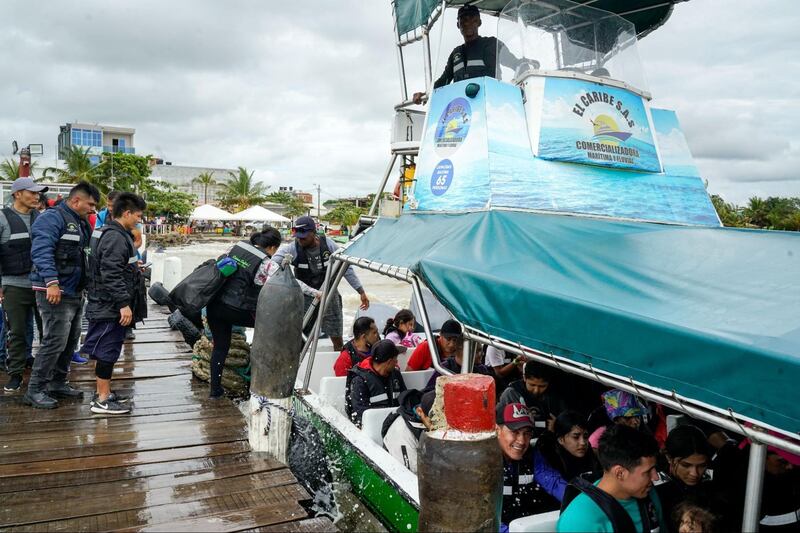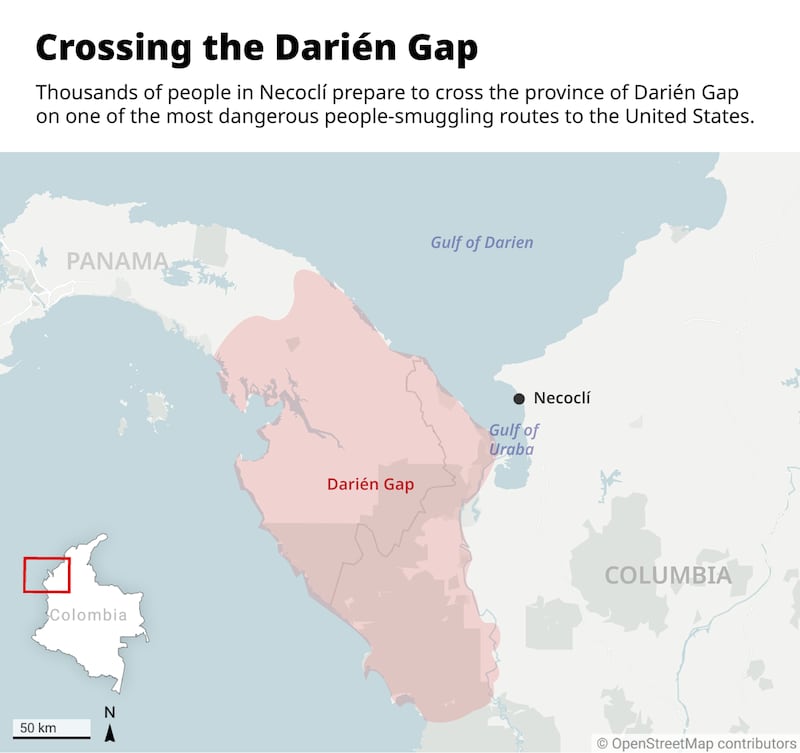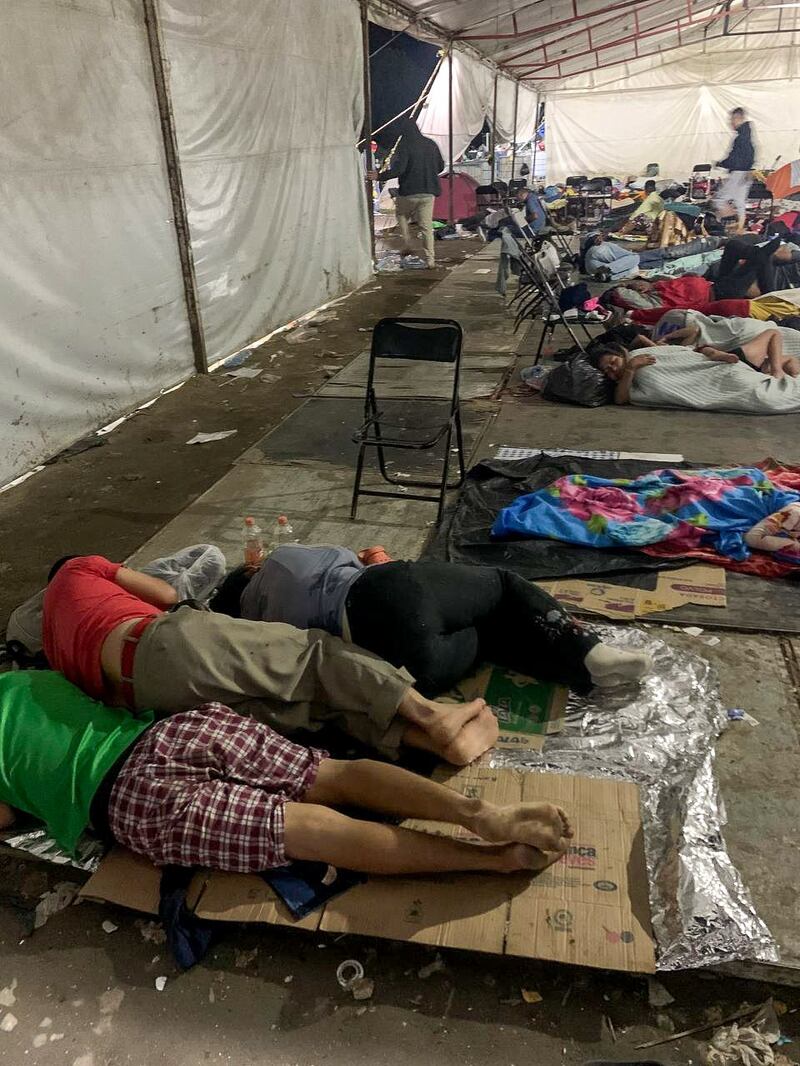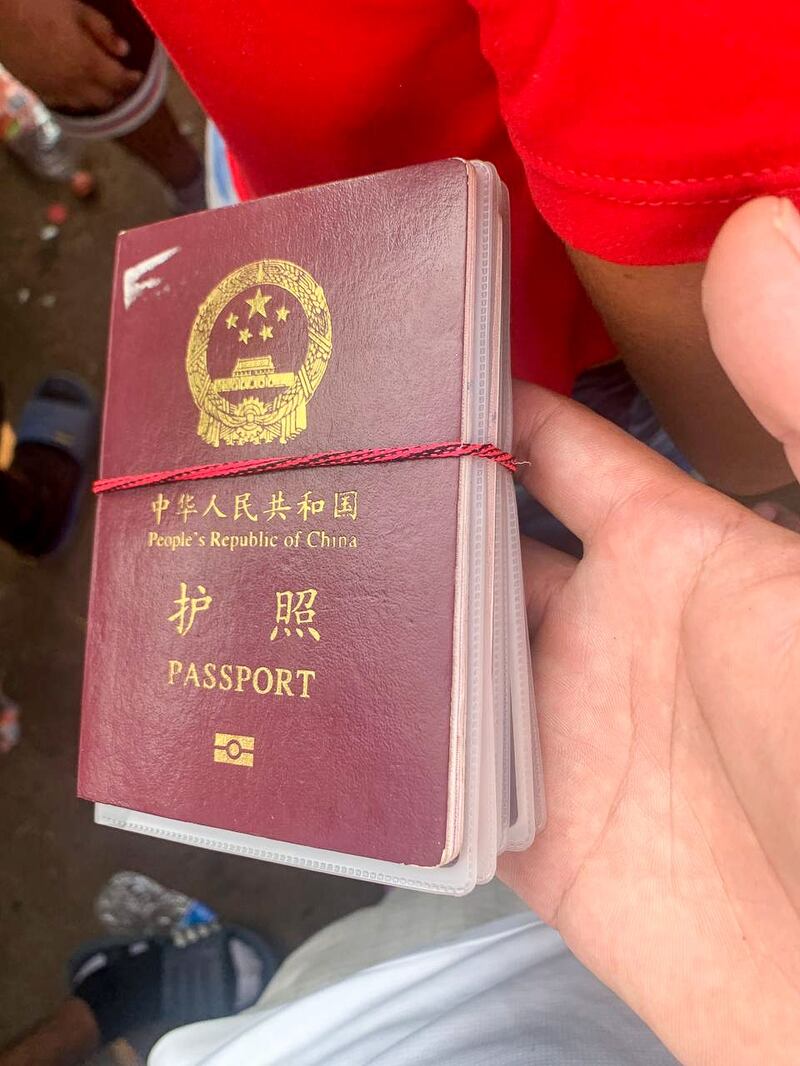It's morning in the Colombian port town of Necoclí, and a large group of Chinese nationals, including three children and a woman with a baby, have their lifejackets on, waiting for a launch to take them across the Gulf of Urabá to a landing point in neighboring Panama.
Elsewhere in the town, people of Chinese descent -- mostly young or middle-aged and predominantly male -- can be seen buying up camping gear and waterproof boots, while others eat in local restaurants with Caribbean salsa blaring outside, despite not knowing a word of Spanish.
They are preparing to brave the Darién Gap, one of the most dangerous people-smuggling routes to the United States, joining hundreds of thousands of others from Venezuela, Haiti, Ecuador and further afield whose tents once turned Necoclí's beaches into scenes resembling a summer festival.
Many businesses have grown up in the town to accommodate their needs, often because the people-smuggling business is far more lucrative than tourism.
"Selling boat tickets to immigrants is a much more important [part of our business] than the tourism business," yacht company owner Freddy Marín says, adding that he sees his company as rendering a valuable service to people in need of help.
Some 80% of Marín's customers come from this trade, he says.
One group of five Chinese travelers eating in one of the cafes says they didn't know each other before they arrived in town, but found each other via social media, and are relying on translation apps to get around the language barrier.
Two of the waiting boat passengers immediately cite the Chinese Communist Party's zero-COVID policy as the main driver of their decision to join the droves of mostly middle class people leaving China, in a phenomenon that has come to be known as "run," a play on a Chinese character that sounds a little like the English word by the same name.

‘Longing for freedom’
"I couldn't take it any more, so I left to travel, and see the world," a young father from Beijing who gave only the pseudonym Zhifeng says with a wry smile. He is sitting on a concrete bench near the dock, wearing flip-flops. He left China along with his 10-year-old son in August.
"I couldn't bear that my son had to do COVID-19 tests at school every day," Zhifeng says, adding that he didn't see much hope of change given that Communist Party leader Xi Jinping seemed set to win an unprecedented third term in office at the party congress.
In a more philosophical tone, he muses: "We're all fleeing persecution and longing for freedom on this journey."
Back in the cafe, a stylishly dressed young woman says she had high hopes for China's economic development, but that the rolling lockdowns, mass tracking and compulsory daily testing of the zero-COVID policy were "intolerable," prompting her to "take a risk."
She says she may think about going back to China in five or six years' time.
A young man sitting at the same table shouts: "I won't be going back while Xi Jinping is still in power!"

The travelers are part of a growing phenomenon of Chinese nationals seeking to brave the notorious Darién Gap people-smuggling route through the jungle from Panama to Colombia in a bid to cross eventually into the United States.
"Coming here is basically a gamble with your life," says Zhou Jun, a former rights activist and off-road motorcycle fan from the eastern province of Jiangsu.
Zhou, a card-carrying political refugee recognized by the United Nations, says he was held in a psychiatric hospital twice by the authorities in 2017 and in 2019 after he rode his bike into highly restricted parts of the Himalayas, including Tibet.
"We are persecuted, and the fear of the Chinese Communist Party is engraved in our bones," Zhou says, adding that he has deliberately cut off all contact with his family for fear of exposing them to political reprisals back home.
Zhou, who sports a tattoo of Che Guevara on his upper right arm, has arrived in Colombia by way of Thailand and other Latin American countries, on what he says has been a "profound journey."

Chinese nationals increasing
Near the jetty where the travelers will embark, the United Nations' International Organization for Migration has set up a tent, while the local government has its own tent facing it. A third canopy provides shade to people waiting to board the next vessel to Panama, who hail from Afghanistan, India, Latin America, the Caribbean, and, more recently, from China.
A local government official in Necoclí who declined to be named said the number of Chinese nationals turning up in the small port has risen significantly since September.
"Most of the adults from China are adults aged 20 to 30, about 80 percent are men, but there are also some women," the official says. "They are in a slightly better situation than some of the immigrants from other countries, as they have a little money."
"They can afford to eat in restaurants, buy their own food and pay for their own transportation," he says. "They usually leave in a few days without any help [from the authorities]."
He says that while many don't have visas, the authorities prefer to turn a blind eye.
"The current attitude of the Colombian government is to respect the freedom of movement of immigrants," the official says on condition of anonymity. "From a practical point of view, it is really too expensive to send them back."
According to data from the Colombian Immigration Agency, 1,028 Chinese citizens entered Colombia from Ecuador through unofficial channels between January and November 2022, 485 of whom did so in November alone.
Nearly all of them pass through Necoclí, the jumping-off point for the notorious Darién Gap people-smuggling route through the jungle from Panama to Colombia, in a bid to cross eventually into the United States.
According to two shipping companies that ship travelers to the trailhead in Panama, 122 Chinese people have bought tickets during the first week of November.
It's not an easy route, and the first hurdle is getting around a current ban on "non-essential" travel out of China.
Those who manage this make landfall in Ecuador, which has visa-free entry for Chinese nationals.
"There are about 30 or 40 Chinese people on my plane from Turkey to [the Ecuadorian capital] Quito," Zhou Jun tells me. "We know a lot more want to leave, but they are stuck there."
"Some get stuck in China as they try to leave," he says.

Narrow escape
Former automobile manufacturing worker Cheng Jie says he had a narrow escape from China when he tried to get to the former Portuguese territory of Macau from mainland China with his family, after they sold off their car and business and borrowed around U.S. $43,000 to get out of the country.
"We were first locked in a small dark room for interrogation," Cheng said of the family's bid to cross from the southern city of Zhuhai to Macau.
"When the officer came, I handed over my Hong Kong and Macau travel permit, but he asked me to hand over my passport and asked me a lot of questions," Cheng recalls. "He also asked me if I was planning to travel to other countries."
"He took away my mobile phone and passport, and searched my mobile phone with keywords," Cheng says, adding that he had deleted any politically sensitive content before trying to leave China. "Maybe he was afraid that I was an anti-communist and was going abroad to stir up trouble."
"I thought we weren't going to be allowed to leave," he says. "From that moment on, we decided to come here [to the United States]."
But they had no visa, after Cheng's bid to apply for a study visa floundered amid the zero-COVID lockdowns.
So the family flew to Bangkok, then Istanbul, where they spent two weeks, then took a flight to Quito, where they boarded a long-distance bus to Tulcan on the border with Colombia. They hired a driver from there, and drove it to Necoclí, before boarding a boat to the Panamanian jungle route via the Gap of Darién.
They were afraid of running out of money, so had to opt for a five-day-long trek through the jungle to get to Central America, with Cheng carrying all of the family's food and camping equipment in a 15 kilogram backpack that he eventually paid someone else U.S. $50 to carry through the grueling jungle mud and freezing rain.
Their journey included fording a turbulent river swollen with torrential rain, from which his wife had to be rescued, and the loss of their tent due to a misunderstanding caused by the language barrier.
"At the time, I didn't think it was so dangerous that we could have died," Cheng says. "I was pretty scared watching my kids crying as her mother was washed away."
Cheng's wife was fished out of the river by some people behind him, who grabbed her as she was swept closer to the river bank.
Safely in the U.S., Cheng wrote via Twitter: "This place everyone wants to get to may not necessarily be heaven, but you can be sure that the place everyone is willing to risk their lives to escape must be hell."

‘They can’t tolerate such strict controls’
U.S. immigration lawyer Xu Shujuan said many have no choice but to sneak into the U.S., because they can't even claim asylum if they arrive by plane, as passengers are denied boarding by airlines if they lack a valid visa.
"There is a growing demand among Chinese clients to emigrate to the United States," Xu says. "I learned from them that they can't tolerate such strict controls."
"They may have money and assets in China but they choose either to sell them or leave them behind in order just to live a normal human existence," Xu says.
Cheng's family's ordeal wasn't over yet. They were placed in a refugee camp run by the Panamanian government, then took a serpentine route through Nicaragua, Honduras and Guatemala, before finally arriving in Mexico, only to be locked up by border guards overnight before being escorted to get a transit pass.
On the night they crossed the fence from Mexico into the United States, there was a strong wind whipping up sand and dust. On arrival, they were taken into custody by U.S. Customs and Border Protection, where they applied for political asylum.
According to Xu, the asylum application process is relatively straightforward for people who arrive in U.S. territory successfully, without being arrested or sent home.
Asylum-seekers may then apply for a work permit and start working legally after 180 days.
Cheng says his family was separated by border officials in the U.S., and his children were held in an area along with his wife, while he was held with the other men.
"They gave us three meals a day, including hamburgers and fruit, so it wasn't too bad," he says. "But there were 40 or 50 people in our cell."
"We had to just lie on the floor, maybe find a piece of cardboard to use as a mat," he says. "There were so many people that I couldn’t straighten my legs [to go to sleep]."
Cheng's family was released after just one night in detention, because they had three young children with them.
"I told them that I opposed the Communist Party and the [authoritarian] system," Cheng says. "I said I had posted certain content online that meant that I would be locked up in a detention center by the communist police if I were to go back."
He said he has since been approached by many more Chinese people looking to leave.
"I get a lot of people coming to me every day asking me about the route I took, many of them families with children," he says. "I don't encourage them, because that route is too dangerous."
But he recalls that what kept his family going the entire time was the drive to get away from life under a totalitarian regime.
"Once we found out there was a way to escape totalitarian rule, we couldn't stop thinking about it," he says. "At least here I'm not always scared ... and I can say what I want."
Reported by RFA's Mandarin Service in collaboration with The Reporter, a Taiwan-based investigative magazine. Translated by Luisetta Mudie.

